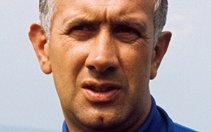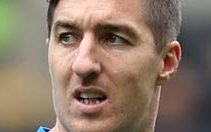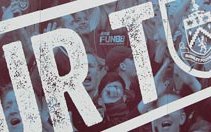Our ‘Back to the Future’ series continues with a review of our games in 1975-76 against Norwich managed by future controversial Clarets manager, John Bond.
The Clarets found life hard in the Premier League in 2010-11 eventually suffering relegation after just one season in the top flight. It had taken them 33 years to have a go against the big boys again but the dream did not last. Life was certainly hard back in 1975-76 too and in a remarkable parallel it was also a season where we had two managers just like 2010-11 although the circumstances were somewhat different.
Owen Coyle of course wanted to leave the club whereas Jimmy Adamson got the boot. Both replacements, both appointed in January also failed to inspire their respective squads to success. In 2010 Brian Laws could only manage three wins from nineteen games with the Clarets relegated after finishing third from bottom.
In 1976, Adamson`s replacement, Joe Brown did not fare much better. He won just five games of the eighteen games in charge with the Clarets doomed to relegation after finishing second from bottom.
Little did we know all those 33 years ago that it would take so long to get back. Back then the world was a different place both on and off the pitch and in our series Back to the Future we continue our story of the life and times of being a Clarets fan all those years ago recalling some memories from the games we played that season.
We continue with our games in 1975-76 against Norwich City.
The Canaries back then were the ‘boing, boing` team long before West Brom even invented the term. Too good for the old Division 2 and a struggling team in Division 1 they began to yo-yo between the divisions in the early to mid seventies. In 1972 they were promoted to Division 1 as Champions with high hopes of success in the top flight under manager, Ron Saunders. That first season after promotion though would be one in which they struggled. In those days only the bottom two clubs were relegated and Norwich escaped win the skin of their teeth by just two points after finishing third from bottom. It was only prolonging the inevitable though and just one season later in 1973-74, the Canaries once more began to struggle with Ron Saunders leaving in mid-season to be replaced by future Burnley manager, John Bond (more about him later!!) Bond was unable to save them though and they finished bottom. The yo-yo went into full swing and after just one season back in Division 2 Bond got them back up after just pipping Sunderland for that third place spot. The Canaries also managed to get to Wembley that season for the second time in three years playing in the League Cup final against Aston Villa, a game which they sadly lost 1-0.
In 1975-76, Norwich would have a good season after returning to the top flight and by the end would finish in a creditable 10th place. This would end their boing, boing tendencies for a time and they would enjoy five more seasons in the top flight before being relegated in 1980-81; a season which would also see the departure of John Bond.
Let`s just talk about John Bond for a moment, especially since he will probably go down in history as one of our most infamous managers , a manager that some blame for the start of our decline as we dropped down the divisions to be within just one Orient game of our league survival!
Bond was a right back who played for West Ham United (1950-1966) and Torquay United (1966-1969) before moving into management. A flamboyant character, he wore ‘bling` before the term was even invented and positively glistened with gold! He first of all turned down the offer to be gaffer at Torquay and started his managerial career with Bournemouth in May 1970 after being on the coaching staff at Gillingham for a short time. He was highly successful at the south coast club leading Bournemouth to promotion, as runners-up in Division Four at the end of his first season. He almost repeated the success the following season with Bournemouth finishing third in Division Three and just missing out on promotion to the second tier.
He had however caught the attention of clubs looking for new managers and Norwich brought him to Carrow Road in November 1973. Bond could do no wrong in those days and just seemed to go from strength to strength. He also made some inspired signings, notably bringing former West Ham and England 1966 World Cup star, Martin Peters to the club in 1975. Bond brought stability to the club and although he couldn`t stop them being relegated in his first season, he got them immediately back up and established the club as a first division side.
Bond resigned to manage Manchester City in October 1980, taking his assistants John Benson and John Sainty with him. It is not clear if Bond saw the writing on the wall at Carrow Road but Norwich were relegated that season so maybe he jumped ship at the right time. Manchester City had made a poor start to the 1980-81 campaign and it had cost the neck of another flamboyant manager, Malcolm Allison. Bond once more hit the ground running and impressed after bringing in some experienced players to supplement his rising stars. City finished in a more respectable mid-table position whilst the following season they improved even more securing 10th spot.
The end of his first season in charge at Maine Road also saw Bond lead City out at Wembley for the FA Cup Final against Tottenham Hotspur, a game they lost 3-2.
Bond was sacked by City in February 1983. At the time City were still in the top half of the table and that sacking may have been a big mistake. John Benson took over and a bad run saw them slide down the table towards the relegation zone before being relegated on the last day of the season.
In June 1983, the high profile John Bond sensationally came to Turf Moor but except for the early excitement and novelty was never really accepted by the Clarets faithful. He was an outsider and a departure from our normal progression of in-house managers. He came to the club after we had just been relegated to the third tier of English football and there were high hopes he would see us instantly promoted back to Division Two.
He made some exciting signings with Kevin Reeves, Tommy Hutchison and Joe Gallagher arriving at the club but also upset many by selling a number of rising stars including future England internationals, Trevor Steven and Lee Dixon. Our current manager, Brian Laws might also have a few things to say about John Bond. A player at the club at the time having been named player of the year only the season before; he too found himself on the transfer list!
The biggest mistake though that Bond made was to strip Clarets legend, Martin Dobson of his captaincy and give the honour to new boy, Tommy Hutchison. This was guaranteed to anger an already suspicious set of fans. Dobson, in his second spell at the club would also leave later in the season to become player/manager at Bury.
John Bond was perhaps too much for the club and the fans to contend with and he made a large number of changes both to the backroom staff as well as the players with John Benson, John Docherty and John Sainty brought in to help him behind the scenes.
Some would say he made far too many changes but he may have changed hearts and minds had results gone his way on the pitch and it all started off pretty well. Although we lost to lowly Crewe in the League Cup and despite unsettling shenanigans at board room level, the Clarets began to play some attractive football.
They began to rise up the table putting together some convincing wins with goals flowing left right and centre. Our first home game was a 5-1 thumping against Bond`s former club, Bournemouth which went some way to cancelling out our 4-1 defeat away to Hull on the opening day of the season. Port Vale got on the end of a 7-0 tonking by the Clarets at Turf Moor and by the end of the season we had scored four or more goals in six matches.
Our season though fell apart after we lost striker, Kevin Reeves to injury following a FA Cup third round replay against Oxford United at the Manor Ground on the 11th January 1984. He limped off with 18 minutes to go with a seemingly innocuous hip injury but it would turn out to be an injury that would end his football career at the age of 26.
We seemed to have lost our driving force up front and up to the time of his injury he had scored 12 goals for the Clarets in 31 appearances after being signed by John Bond from his former club, Manchester City. More importantly he was also key in his assists to the likes of Billy Hamilton and Tommy Hutchison. We won just five league games after that, drawing eight and losing 10 matches including our last four of the season.
Those last few defeats though could have been down to the fact that Bond had decided not to bother going to the matches instead spending his time on a recruitment drive looking for new players for the next season.
We had been in with a shout of promotion before losing Reeves and were pushing for most of the first part of the season in 7th or 8th spot but just six points from thirty six points available from the last 18 games of the season said it all. We still finished in 12th spot though and things just seemed to continue in the close season with Bond bringing in seven new players all of them on free transfers.
However with just five days to go before the start of the new season, Bond was sacked and his side-kick for many years, John Benson took over. Bond went on to manage Swansea City, Birmingham City and Shrewsbury Town. He certainly did not want to be reminded of his days at Turf Moor seemingly scared to face the taunts of the Clarets fans. In a clash between Shrewsbury and Burnley in the FA Cup, Bond famously refused to come to the home game although it was alleged the police advised him not to attend and in the replay at Gay Meadow he was found hiding at the back of the stand in a steward’s coat for the entire game! At the end of July 1993, Bond resigned, along with the Shrewsbury chairman and that was really the end of his managerial career. After that he was a football commentator for BBC Radio Five Live but returned to the football scene as a scout to help out his son, Kevin now manager at Stafford Rovers. In November 1998, Bond was appointed manager at Northern Premier League Witton Albion before retiring. There was still a last hurrah though when his former second-in-command, John Benson brought Bond out of retirement to assist him at Wigan Athletic on the scouting, coaching and consultancy front in September 1999.
The role would last less than 12 months and this time Bond would finally retire. He is now 77 and will always remain a dark figure in Clarets history although we will never know what might have been had Reeves not picked up that football career wrecking injury.
So there we have it a potted history of John Bond but that was all to come when we lined up against Bond`s Norwich during 1975-76
In a remarkable game at Turf Moor on Saturday 13th September 1975 in front of a 15,513 crowd, Peter Noble scored four goals but it was not enough to secure both points and we had to settle for a 4-4 draw. Noble became only the second Clarets player to score four goals and not end up on the winning side following in the footsteps of Tommy Jones back in 1932 who scored four in a game against West Ham at Upton Park. This match too ended up 4-4!
Noble had given us the lead in the first minute and then got his second putting us 2-0 up after 26 minutes. Norwich pulled a goal back after 31 minutes before Noble got his hat-trick on 43 minutes to give the Clarets a 3-1 half-time lead. In the second half, Clarets fans hearts dropped as Norwich came back to bring the scores level thanks to goals after 66 and 76 minutes. We looked to have won the match with three minutes to go when Noble got his 4th but it was Norwich who had the last laugh equalising in the final minute of the match.
Norwich`s squad that season contained some well-known names. We have already mentioned Martin Peters but also in the side was Scottish international striker, Ted MacDougall. MacDougall had made a name for himself under Bond at Bournemouth In 1972, He moved to Old Trafford after Manchester United offered Bournemouth £200,000 for his services in 1972 before joining West Ham in 1973. He only had a short spell at Upton Park with Bond being reunited with his former striker after signing him for Norwich the same year thus becoming the country`s first £0.5 million player!
MacDougall linked up well with fellow striker, Phil Boyer. The duo had previously played together at Bournemouth and York and it was Bond who reunited the pair at Carrow Road signing Boyer for £145,000 in February 1974. Boyer was touted as a future England international but in the end picked up just one cap in 1976.
The return match for the Clarets at Carrow Road on Saturday 10th January 1976 was actually new manager, Joe Brown`s first game in charge and sadly it was not going to be a winning start. Norwich were 3-0 up by the hour mark and a goal by Newton on 64 minutes was to prove to be only a consolation goal.
This match would also be remembered for the fact this would be the last Clarets game for both Frank Casper and Mick Docherty. Casper had struggled with injury and eventually would move into coaching and management at the club. Docherty was released at the end of the season and joined Manchester City on a free transfer.
Back to the Future will continue next with Number 8 in the series and will review how well we did against Birmingham City.



I see the Official Site have nicked my title ‘Back to the Future’ but then I did nick it off Steven Spielberg and he hasn’t done me for copyright yet!! 😉
Ah, the days of Frank Casper . . . . what a striker, happy days.